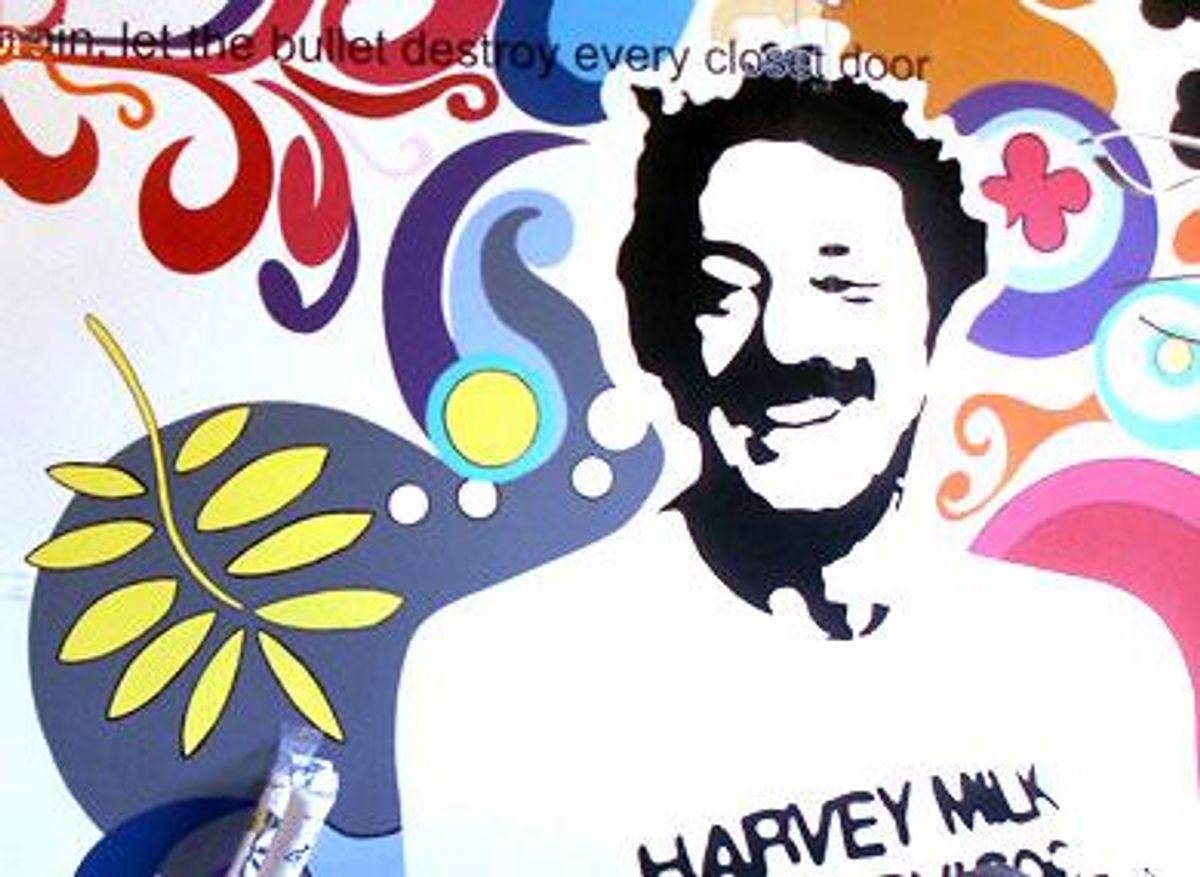
With interest in the movie at a fever pitch in the Castro, businesses are taking advantage -- just as the man himself would've wanted.
October 22 2008 12:00 AM EST
November 17 2015 5:28 AM EST
By continuing to use our site, you agree to our Private Policy and Terms of Use.

With interest in the movie at a fever pitch in the Castro, businesses are taking advantage -- just as the man himself would've wanted.
It's the first weekend of October, and at the Castro Street Fair in San Francisco, Harvey Milk is everywhere: on the fair's official T-shirt and program; on a podium near the intersection of Castro and Market streets, where state assemblyman Mark Leno is plugging the Gus Van Sant film Milk ; and at the famous Castro Theatre. The movie palace is a regular tourist stop, but today the out-of-towners aren't taking pictures of its grandiose baroque facade or neon sign. It's posters for Milk they're photographing. Apparently, Milk, who founded the fair in 1974 as one of his many acts to bolster business in the area, is once again the mayor of Castro Street.
And everyone is trying to capitalize on his resurrection. "GLBT history is an economic engine for the city," says Paul Boneberg, executive director at the local GLBT Historical Society. With the donation of a one-year rent-free lease from Washington Mutual, the nonprofit organization is opening a storefront museum at the gayest intersection in America -- Castro and 18th streets -- dedicated to California's gay and lesbian history. "We have a lot of Milk memorabilia from our archives," Boneberg says, which "will really show the community that Harvey Milk came into and galvanized." After Milk 's world premiere here on October 28 (followed by a City Hall gala), Boneberg and others expect "lines around the block" to get into the film's screenings. They hope that energy and interest spills over to their storefront, laying the foundation perhaps for a permanent gallery space in the future.
Merchants in the Castro are also hoping for a big bump in business from both tourists and locals. A major pop-cultural event like Milk brings in "peripheral business -- people we wouldn't normally expect to come into the store," says Dominic Estrello, a clerk at All American Boy, a casual clothing store for men. A party is planned at Harvey's (known as the Elephant Walk bar in Milk's day and renamed in honor of him in 1996) and there's talk of closing down Castro Street for an open-air celebration after the movie's premiere.
Some businesses plan to do Milk-themed window displays, like the one in the works at A Different Light bookstore, centered on Randy Shilts's Milk biography, The Mayor of Castro Street , along with other gay history titles from the period. The store is also organizing relevant readings and other events. Assistant manager Stephen Quinones says he's already seeing a boost in customer traffic and excitement related to the movie. Friends who acted as extras have p been sending trailers of the film around, he notes. And while rising rents are making it harder for many younger gay men and lesbians to live in the Castro, Quinones is optimistic that the hype surrounding Milk may help fill the void. "Hopefully this will bring the community back a bit and reintroduce some energy," he says.
Walking tours of the Castro have always stopped at the site of Milk's pioneering business, Castro Camera, one of the district's first gay-owned shops. But thanks to the current occupant of the storefront, home-interior store Given, tourists now have more to look at than in the past. Owner Nick Romero commissioned a mural of Milk by local artist John Baden for the inside wall of his store when he moved in last year. "I wanted something controversial, something obvious, visible," he says, pointing to the gun at one edge of the image. The mural, he says, has "become a community symbol" -- just as Milk was when he ran his campaign operations from that same spot in the 1970s.
Romero allowed the producers of Milk to take over his store during filming (the movie was shot primarily in the Castro). Unlike the previous business owners, who he says played down the site's history, Romero's happy to talk to visitors about the shop's lineage. "Milk did so much to further our rights," Romero says. "I'm a husband, father of two kids, and I owe that in part to him." Romero too has noticed an upsurge of interest in all things Milk, and he's responding with Milk-specific marketing. "We use the mural imagery in our promotions," he says, "and I'm hoping to get some T-shirts made."